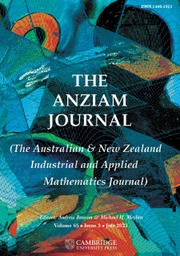Article contents
On the problem of uncoupling systems of linear differential equations
Published online by Cambridge University Press: 17 February 2009
Abstract
In modelling phenomena involving diffusion and chemical reactions, coupled systems of linear differential equations are often obtained, which can involve several dependent variables. For two dependent variables, coupled reaction-diffusion systems can be uncoupled, and in principle the original boundary value problem can be reduced to two separate boundary value problems for the classical heat equation. Here we address various aspects of the fundamental unsolved problem of the determination of corresponding uncoupling transformations for systems involving several dependent variables. We present, in an elementary manner, the current state of knowledge relating to this complex problem area. Several new results are obtained here. For example, in reviewing known results two dependent variables we observe that those systems for which uncoupling transformations have been found are essentially those which can be reduced to a coupled system involving a single spatial operator L. In addition, for several dependent variables, the general solution structure for the kernel matrix, involved in the uncoupling transformation, is presented together with some explicit results for values of components of the kernel matrix along characteristics, which are deduced from elementary considerations.
Information
- Type
- Research Article
- Information
- Copyright
- Copyright © Australian Mathematical Society 1989
References
- 3
- Cited by

